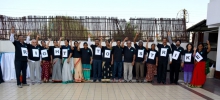PSI affiliates in India support global right to strike campaign

Public employees in Tamil Nadu, India, have been struggling for the right to strike since 2003. On 1 July 2003, they called for an indefinite strike against the State Government's action to withdraw pension benefits & entitlements. The Government started arresting the union leaders and members even before the strike commenced. The strike took place on 2 July, and on 5 July, Tamil Nadu Essential Services Maintenance ACT (TNESMA) was invoked and the government dismissed 170,241 government employees and teachers. On 24 July, the Supreme Court ordered the reinstatement of all dismissed workers, with the exception of those previously arrested or who had received a written dismissal notice. The Supreme Court of India stated that as a condition, every employee should tender a written apology and undertake to abide by Rule 22 of Tamil Nadu Government Servants Conduct Rules, which prohibits government employee from engaging in strike. Later the court further declared that "Government employees had no fundamental, legal, moral or equitable right to go on strike". More here.
India has not ratified ILO Conventions 87 & 98 and there is no legal obligation for State or Central governments to recognise a public sector union or engage in collective bargaining. The law permits government employees to form Associations under the Societies Act, leaving these workers outside the provisions of the Trade Union Act. Although many unions have informal recognition, this can be and is taken away as the government pleases.
PSI affiliates, at a joint PSI meeting at Nagpur, expressed deep concern over the continued denial of rights to the public employees in India and expressed their solidarity to the global campaign for the Right to Strike. Bro. R.Srinivasan, PSI Executive Committee member representing South Asia, called upon the Government of India to ratify ILO Conventions 87 & 98 and make necessary amendments in the trade union act to grant the right to strike to public employees in India.

